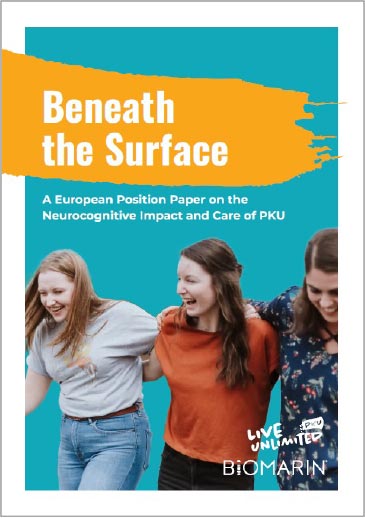‘Beneath the Surface’: Position Paper
Phenylketonuria (PKU) can impact peoples’ lives in hidden ways every day.
For people living with phenylketonuria, high phenylalanine levels can adversely impact their mood, concentration and mental health. 1, 2, 3 This is in addition to the wider emotional challenges associated with managing this complex, lifelong condition.4
On the surface, there is a clear route for diagnosing and managing phenylketonuria. However, phenylketonuria is a hidden illness with many facets that are not always physically obvious to others.
The Live Unlimited PKU campaign developed the ‘Beneath the Surface’ position paper and executive summary to explore the neurocognitive, psychosocial and mental health impact of phenylketonuria and how this affects those living with this condition.
‘Beneath the Surface’ Position Paper
Download this resource.
SHARE THIS RESOURCE ON YOUR SOCIAL MEDIA
‘Beneath the Surface’ Executive Summary
Download this resource.
SHARE THIS RESOURCE ON YOUR SOCIAL MEDIA
What are the findings of the ‘Beneath the Surface’ position paper?
The paper highlights that people living with phenylketonuria (PKU) can be impacted by their condition in the following ways:




What changes does the ‘Beneath the Surface’ position paper outline?
To support people living with phenylketonuria, the ‘Beneath the Surface’ position paper calls for the following changes:
1. Psychological and practical support
2. Tools to support conversations with clinicians
3. Individualised care for PKU patients
4. Collaboration across the rare disease community




- PKU (2021). How PKU Affects the Brain. Available at: https://www.pku.com/about-pku/phe-in-the-brain. [Accessed April 2023]
- Gentille, J.K., Ten Hoedt A.E., Bosch, A.M (2010) Psychosocial aspects of PKU: Hidden disabilities – A review. Mol Genet Metab, 99 Suppl 1:S64-7. doi: 10.1016/j.ymgme.2009.10.183.
- Ford S, O’Driscoll M, MacDonald A (2018). Living with phenylketonuria: lessons from the PKU community. Mol Genet Metab Rep, 17: pp 57–63. 10.1016/j.ymgmr.2018.10.002
- Nunn, R (2017). “It’s not all in my head!” – The complex relationship between rare diseases and mental health problems. Orphanet journal of rare diseases, 12(29). Available at: https://ojrd.biomedcentral.com/articles/10.1186/s13023-017-0591-7 [Accessed June 2021]
- Bartus, A., Palasti, F., Juhasz, E., et al. (2018) The influence of blood phenylalanine levels on neurocognitive function in adult PKU patients. Metabolic Brain Disease, 33, pp. 1609–1615 (2018)
- Mütze, U., Roth, A., Weigel, J.F.W., et al (2011). Transition of young adults with phenylketonuria from pediatric to adult care Mutze. J Inherit Metab Dis, 34(3), pp. 701-9. doi: 10.1007/s10545-011-9284-x. Epub 2011 Feb 9.
- Borghi, L., Moreschi, C., Toscano, A., et al (2020). The PKU & ME study: A qualitative exploration, through co-creative sessions, of attitudes and experience of the disease among adults with phenylketonuria in Italy. Mol Genet Metab Rep. 2020 Jun; 23: 100585. Published online doi: 10.1016/j.ymgmr.2020.100585
Job code: EU-PKU-00548 | Date of prep: June 2023
